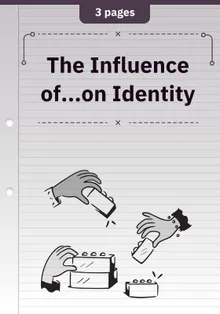
The Influence of...on Identity
Objective:
The overarching learning goal of the worksheet is to explore the influence of specific topics on personal identity, focusing on the effects on self-perception and mental well-being.
Content and Methods:
The worksheet addresses key topics such as the shaping of identity through, the impact on self-esteem, and balance. Methodologically, it employs group discussions, case studies (e.g., a personal story), and reflective questions to encourage critical thinking and personal reflection.
Competencies:
- Development of critical thinking skills.
- Enhancement of self-awareness and personal identity management.
- Improvement of communication and collaboration skills through group discussions.
Target Group and Level:
Grade 9 and above
65 other teachers use this template
Target group and level
Grade 9 and above
Subjects
The Influence of...on Identity

Listen to this scientist talk about the influence of external factors on our identity
The Shaping of Identity: A Social Media Case Study
Disclaimer: This is a fictional story.
Introduction
Emma Thompson, a 28-year-old marketing professional from New York City, is an intriguing example of how social media can shape personal identity. This case study explores the transformative effects of social media on her self-perception, career, and personal life.
Early Adoption
Emma joined social media platforms during her college years, initially using them to stay connected with friends and family. Over time, her engagement deepened as she discovered communities that shared her interests in fashion and wellness. The validation she received through likes and comments began to influence her self-esteem and sense of worth.
Career Boost
Recognizing the potential of social media, Emma started a fashion blog and an Instagram account dedicated to her style and lifestyle tips. Her follower count quickly grew, and she soon became a micro-influencer. This online presence opened doors to collaborations with brands and eventually led her to a career in digital marketing. Emma's professional identity became intertwined with her social media persona.
Personal Challenges
However, the pressure to maintain a perfect online image took a toll on Emma's mental health. She began to equate her self-worth with her social media metrics, leading to anxiety and burnout. The curated and often exaggerated lives of others made her feel inadequate, despite her successes.
Realization and Balance
After a period of introspection and therapy, Emma acknowledged the negative impact of social media on her life. She decided to set boundaries, reducing her screen time and focusing on real-world interactions. This balance allowed her to reclaim her sense of identity, separate from her online persona.
Conclusion
Emma Thompson's journey illustrates the profound influence of social media on personal identity. While it provided opportunities for career growth and community building, it also posed significant challenges to her mental well-being. Her story highlights the importance of mindful engagement with social media to maintain a healthy sense of self.
Disclaimer: This is a fictional story.
4 perspectives
Form groups of 4 and discuss the topic.
Digital Marketing Specialist

Mental Health Counselor

Social Media Influencer

Politician

Reflect on these questions
EXTRA
Support files for all role cards
Always make sure the information are accurate and up to date
Support File for the Social Media Analyst
Social Media Usage Demographics
Global Statistics:
- As of 2023, there are approximately 4.9 billion social media users worldwide, accounting for over 60% of the global population.
- Source: Statista - Number of social media users worldwide from 2017 to 2027
Age Distribution:
- Ages 18-29: 84% use at least one social media site.
- Ages 30-49: 81% use social media.
- Ages 50-64: 73% use social media.
- Ages 65+: 45% use social media.
- Source: Pew Research Center - Social Media Fact Sheet (2021)
Platform Popularity:
- Facebook: 2.9 billion monthly active users.
- YouTube: 2.5 billion users.
- WhatsApp: 2 billion users.
- Instagram: 1.4 billion users.
- TikTok: 1 billion users.
- Source: DataReportal - Digital 2022 Global Overview Report
Influence of Social Media Algorithms on User Identity
Filter Bubbles:
- Algorithms curate content based on user behavior, creating personalized environments that reinforce existing beliefs.
- Source: Pariser, E. (2011). The Filter Bubble: What the Internet Is Hiding from You. Penguin Press.
Echo Chambers:
- Users are often exposed to homogeneous viewpoints, which can polarize opinions and shape identity.
- Source: Sunstein, C. R. (2018). #Republic: Divided Democracy in the Age of Social Media. Princeton University Press.
Algorithmic Bias:
- Algorithms may inadvertently perpetuate societal biases present in data, affecting marginalized groups.
- Source: Benjamin, R. (2019). Race After Technology: Abolitionist Tools for the New Jim Code. Polity Press.
Identity Reinforcement:
- Continuous feedback loops from algorithm-driven content can solidify self-perception and group identity.
- Source: Bucher, T. (2018). If…Then: Algorithmic Power and Politics. Oxford University Press.
Psychological Effects on Self-Perception
Social Comparison:
- Users often compare themselves to idealized representations, impacting self-esteem and satisfaction.
- Study: Vogel, E. A., et al. (2014). "Social comparison, social media, and self-esteem." Psychology of Popular Media Culture, 3(4), 206–222.
Fear of Missing Out (FOMO):
- Anxiety arising from the perception that others are experiencing more rewarding events.
- Study: Przybylski, A. K., et al. (2013). "Motivational, emotional, and behavioral correlates of fear of missing out." Computers in Human Behavior, 29(4), 1841–1848.
Body Image Concerns:
- Exposure to edited images can lead to dissatisfaction and unhealthy body image perceptions.
- Study: Fardouly, J., et al. (2015). "Social comparisons on social media: The impact of Facebook on young women's body image concerns and mood." Body Image, 13, 38–45.
Strategies for Healthier Social Media Consumption
Digital Literacy Education:
- Enhancing users' ability to critically assess online content.
- Resource: Hobbs, R. (2010). Digital and Media Literacy: A Plan of Action. Aspen Institute.
Mindful Engagement:
- Encouraging intentional and purposeful use of social media platforms.
- Technique: Setting time limits and focusing on positive interactions.
Content Diversification:
- Following a variety of sources to break out of algorithm-induced echo chambers.
- Suggestion: Regularly reviewing and updating follow lists.
Promoting Authentic Connections:
- Prioritizing meaningful interactions over passive scrolling.
- Study: Burke, M., & Kraut, R. E. (2016). "The relationship between Facebook use and well-being depends on communication type and tie strength." Journal of Computer-Mediated Communication, 21(4), 265–281.
Support File for the Politician
Advocating for User Privacy
Data Protection Regulations:
General Data Protection Regulation (GDPR): A comprehensive data protection law in the EU that emphasizes user consent and control over personal data.
California Consumer Privacy Act (CCPA): Grants California residents rights regarding their personal data held by businesses.
Proposed Policy Measures:
- Stricter Consent Requirements: Ensuring that users are fully informed about data collection.
- Right to Be Forgotten: Allowing users to request deletion of their data.
- Data Minimization: Limiting data collection to what is necessary for service provision.
Social Media's Role in Shaping Public Opinion and Identity
Influence on Elections:
- Social media platforms have been used to sway public opinion during elections through targeted advertisements.
- Example: Cambridge Analytica scandal.
- Source: Cadwalladr, C., & Graham-Harrison, E. (2018). "Revealed: 50 million Facebook profiles harvested for Cambridge Analytica in major data breach." The Guardian.
Spread of Misinformation:
- False information can spread rapidly, affecting public perceptions and discourse.
- Study: Vosoughi, S., et al. (2018). "The spread of true and false news online." Science, 359(6380), 1146–1151.
Identity Politics:
- Platforms facilitate the formation of identity groups, influencing political engagement.
- Source: Bennett, W. L., & Segerberg, A. (2012). "The logic of connective action." Information, Communication & Society, 15(5), 739–768.
Legislation to Combat Misinformation and Cyberbullying
Anti-Misinformation Laws:
- Introducing penalties for platforms that fail to address the spread of fake news.
- Example: Germany's Network Enforcement Act (NetzDG).
- Source: German Federal Ministry of Justice and Consumer Protection
Cyberbullying Prevention:
- Implementing educational programs and stricter enforcement against online harassment.
- Source: Patchin, J. W., & Hinduja, S. (2012). "Cyberbullying prevention and response: Expert perspectives." Routledge.
Platform Accountability:
- Amending legal protections to hold platforms responsible for user-generated content.
- Discussion around Section 230 of the Communications Decency Act in the U.S.
- Source: Electronic Frontier Foundation - CDA 230
Importance of Digital Literacy Education
Curriculum Integration:
- Incorporating digital literacy into school programs to equip students with critical evaluation skills.
- Resource: UNESCO's "Media and Information Literacy Curriculum for Teachers."
- Source: UNESCO
Public Awareness Campaigns:
- Government-led initiatives to educate citizens on navigating digital information.
- Example: Canada's "Get Cyber Safe" campaign.
- Source: Get Cyber Safe
Partnerships with Tech Companies:
- Collaborating with platforms to develop tools and resources for digital education.
- Example: Google's "Be Internet Awesome" program.
- Source: Be Internet Awesome
Support File for the Psychologist
Impact of Social Media on Self-Esteem and Identity Formation
Self-Esteem Concerns:
- Excessive social media use is linked to decreased self-esteem and increased feelings of inadequacy.
- Study: Chen, W., & Lee, K.-H. (2013). "Sharing, liking, commenting, and distressed? The pathway between Facebook interaction and psychological distress." Cyberpsychology, Behavior, and Social Networking, 16(10), 728–734.
Adolescent Identity Development:
- Social media platforms influence teens' exploration and formation of identity.
- Source: Erickson, E. H. (1968). Identity: Youth and Crisis. W. W. Norton & Company.
Online vs. Offline Identity:
- Discrepancies between one's online persona and real-life self can cause internal conflict.
- Study: Butler, S. M., & Matook, S. (2015). "Social media and relationships: Managing social media impacts on adult friendships." Information Systems Journal, 25(5), 545–561.
Social Comparison and Online Validation
Social Comparison Theory:
- Individuals determine their own social and personal worth based on how they stack up against others.
- Original Theory: Festinger, L. (1954). "A theory of social comparison processes." Human Relations, 7(2), 117–140.
Negative Effects:
- Frequent comparisons can lead to envy, low self-esteem, and depression.
- Study: Chae, J. (2018). "Explaining females’ envy toward social media influencers." Media Psychology, 21(2), 246–262.
Seeking Validation:
- Dependency on likes and positive comments for self-worth can be detrimental.
- Study: Kim, J., & Chock, T. M. (2017). "Personality traits and psychological motivations predicting Instagram self-presentation, selfies, and sociability." Telematics and Informatics, 34(5), 560–571.
Strategies to Build a Healthy Self-Identity
Mindfulness Practices:
- Techniques to stay present and reduce overreliance on social media feedback.
- Resource: Kabat-Zinn, J. (1994). Wherever You Go, There You Are: Mindfulness Meditation in Everyday Life. Hyperion.
Digital Detox:
- Taking scheduled breaks from social media to reconnect with oneself.
- Study: Vanman, E. J., et al. (2018). "The burden of online friends: the effects of giving up Facebook on stress and well-being." Journal of Social Psychology, 158(4), 496–507.
Cultivating Offline Relationships:
- Strengthening in-person connections to enhance social support networks.
- Source: Putnam, R. D. (2000). Bowling Alone: The Collapse and Revival of American Community. Simon & Schuster.
Advocating for Mental Health Resources
Accessible Counseling Services:
- Promoting online and community mental health resources.
- Example: National Alliance on Mental Illness (NAMI) programs.
- Source: NAMI
Workshops and Seminars:
- Hosting events focused on digital well-being and resilience.
- Resource: American Psychological Association's guidelines on technology use.
- Source: APA
Collaboration with Platforms:
- Encouraging social media companies to implement features that support mental health.
- Example: Instagram's efforts to hide like counts.
- Source: Instagram's Well-being Initiatives
Support File for the Influencer
Personal Experiences with Social Media Shaping Identity
Authenticity vs. Curation:
- Balancing genuine self-expression with curated content to engage audiences.
- Source: Marwick, A. E., & boyd, d. (2011). "To see and be seen: Celebrity practice on Twitter." Convergence, 17(2), 139–158.
Storytelling:
- Using personal narratives to connect with followers and build a relatable brand.
- Example: Influencers sharing daily life experiences.
Community Engagement:
- Fostering a sense of belonging among followers through interactive content.
- Technique: Live Q&A sessions, polls, and direct messages.
Pressures of Maintaining an Online Persona
Content Demands:
- The necessity to post consistently to maintain relevance can lead to stress.
- Study: Gemmill, E. L., & Peterson, M. (2006). "Technology use among college students: Implications for student affairs professionals." NASPA Journal, 43(2), 280–300.
Public Scrutiny:
- High visibility invites criticism and trolling, impacting mental health.
- Source: Tokunaga, R. S. (2011). "Following you home from school: A critical review and synthesis of research on cyberbullying victimization." Computers in Human Behavior, 26(3), 277–287.
Platform Algorithms:
- Changes in algorithms affect content visibility, adding pressure to adapt strategies.
- Example: Shift towards video content on platforms like Instagram and TikTok.
Positive Aspects of Social Media Influence
Platform for Change:
- Using influence to advocate for social justice, environmental issues, and charitable causes.
- Example: Fundraising campaigns through social media.
Educational Content:
- Sharing knowledge and skills with a broad audience.
- Example: Tutorials, webinars, and informative posts.
Inspiring Others:
- Motivating followers to pursue goals and engage in positive behaviors.
- Study: Reade, J., et al. (2020). "Empowering the self on social media: Motivational processes and psychosocial outcomes." Cyberpsychology, Behavior, and Social Networking, 23(1), 36–42.
Advocating for Authenticity and Transparency
Honesty in Promotions:
- Disclosing sponsored content and being transparent with followers.
- Regulation: Federal Trade Commission's endorsement guidelines.
- Source: FTC Endorsement Guides
Sharing Real-life Challenges:
- Posting about personal struggles to humanize the influencer persona.
- Impact: Builds trust and relatability with the audience.
Encouraging Critical Thinking:
- Prompting followers to question and reflect rather than passively consume content.
- Technique: Posing open-ended questions, encouraging dialogue.
Note: All sources are intended to provide credible information to support the topics discussed. Ensure that any data or studies referenced are up-to-date and relevant to the current social media landscape.
